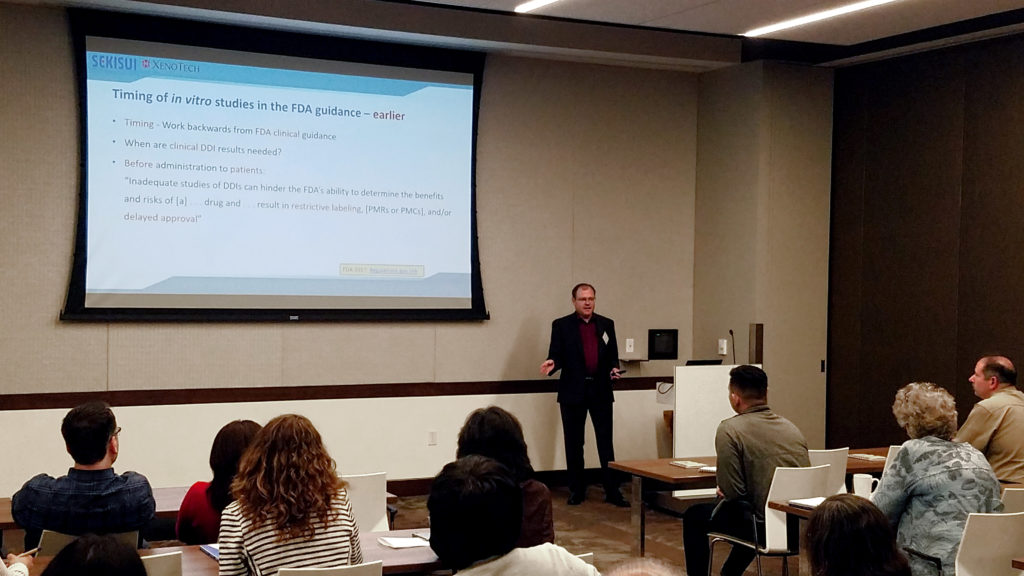

Four Ways CROs Drive Innovation for Improved In Vitro Drug Metabolism and Pharmacokinetics (DMPK) Studies
- Drug Metabolism
- May 17, 2021
- Darina Hynes, Madison Esely-Kohlman
Earlier this year, I had the privilege to attend the DMDG & Swedish Academy of Pharmaceutical Sciences virtual Joint Meeting. This meeting provides a common platform for many researchers and industry professionals to come together and discuss challenges, trends, and cutting edge science relating to in vitro drug metabolism and pharmacokinetics studies. Many esteemed colleagues and researchers from our industry presented on a range of topics relating to in vitro drug metabolism studies and improvements in drug safety and testing standards. One of the most valuable events for me to watch was the annual debate. This year’s topic was “The DMDG/SPS believe that in 2021 CROs are the new champions of DMPK innovation.” The round-table discussion featured the exemplary voices and perspectives of Steve Hood (GSK), Richard Weaver (Sygnature discovery), Steve Madden (Charles River), Kevin Read (University of Dundee (Academic Drug Discovery)) and Tim Miles (GSK, Madrid).
As the panel discussed multiple angles of the topic, I couldn’t help but think about the delicate but crucial relationships between CROs, pharma industry, biotechs and academia. CROs have come a long way since the 1990s and often occupy positions as specialty providers focused on specific pieces. The agility and focused growth allow drug developers to outsource expertise and benefit the industry at-large by fostering innovation. Panelists at the debate highlighted the importance of this symbiosis between pharma and CROs, arguing future DMPK innovation will be accelerated through strong strategic partnerships and collaboration across the sector. This debate highlighted for me some of the most impactful considerations I’ve seen when working with drug developers over the course of my career:

1. Balance between focused expertise and comprehensive options for designing in vitro drug metabolism studies
I have worked for XenoTech for 13 years and our company was borne out of a small Kansas laboratory of just a few scientists focused on drug metabolism studies. Over the course of 25 years we have expanded our portfolio to include drug transporters and regulatory consulting services, staying true to our specialized roots while adding a layer of comprehensive and complementary solutions. As ADME and DDI experts, we are still considered niche in the CRO universe but the current accessibility of assays enables a deeper exploration of drug characteristics and risk assessment. In my time I have seen the collaboration aspect of growth and survival take the stage as well. Our partnerships with an in vivo ADME lab in Japan and with Cypex, a provider of recombinant enzymes based in Scotland, enabled us to offer a more comprehensive suite of ADME services and expand our range of products, respectively.
2. Agility in approach and execution of drug metabolism and other in vitro studies
An important notion addressed in the debate is the ability of CROs to provide consultative solutions rather than a rigid set of inflexible services. This is so important because when a drug developer has the capabilities to conduct all their own preclinical work internally, they can tailor testing to the molecule and their strategy. Trusting an external provider can be frustrating and limiting if the CRO offers a plug-and-play approach, starting with a one-size fits-all service or study and applying it to every molecule. In my tenure with a specialty CRO, I have seen this frustration firsthand many times and I’m always thrilled to represent a provider that takes a different tack. Recently, I worked with a client who needed to change up the positive controls in a CYP Inhibition study to meet an EMA regulatory dossier. We were working with tight time constraints and the pressure to make the adjustments quickly was critical to the client’s success. Within a short window, our experts were able to provide high-quality science that fit the high standards of the EMA. I see these kinds of cases all the time, and often hear from drug developers how important agility and integrity are in choosing a CRO. Working with a regulatory-savvy, collaborative, customer-first partner can make all the difference in a sponsor’s confidence in their program and ability to deliver solid results.
3. A true intimacy and commitment to the science
Richard Weaver introduced a concept he referred to as “the changing of the guard,” which really resonated with me. He said, “smaller or newer start-up companies are increasingly less reliant on big pharma capabilities and capital to shepherd potential drug candidates through the drug development cycle.” This trend raises questions around the sustainability of big pharma’s current innovation model and where smaller companies may ultimately take an increasing share of the market by developing and commercializing products according to the Deloitte 10 year report. My experience with XenoTech is that sometimes the very best products and new ideas come from the bench where the work is done—our CryostaX® for example, are a patented format of cryopreserved pooled or single donor hepatocytes created to make drug metabolism assays more efficient. The process of designing and creating the product was a joint effort by our production teams and the services teams who use hepatocytes in their work every day.
4. Reputation for the kind of quality that you’d consider worthy of partnership
“Biotechs are no longer forced to sell to big Pharma but are increasingly going it alone with external DMPK advice from CROs and consultants”. Outsourcing DMPK work makes it possible for drug developers to carry their compound further— when you are insular and self-sufficient, you are limited to your own four walls and people, and for small pharma it’s just not possible to have full teams devoted to every part of the pipeline. When a small biotech or pharma company chooses to outsource these components of their pipeline to CRO providers, that provider can be thought of as a partner that should be held accountable for matching the sponsor’s level of diligence and care. These partnerships with external experts levels the playing field a bit, making it possible for biotech or a smaller company to own their molecule from ideation to market. I’ve seen this trend in action myself—through the years, there has been an uptick in the number of clients I work with who, instead of managing one piece of a drug’s pipeline, take the drug all the way through development and can champion its entry to market by leaning on trusted partners along the way.
It was also inspiring to learn more about academic drug discovery units, especially linked to the University of Dundee Drug Discovery Unit. XenoTech’s roots also came from academia as our company was originally established by Dr. Andrew Parkinson out of the University of Kansas Medical Center, it is amazing to come full circle and see the growth of our company in the constantly evolving CRO space.
Sitting in on this panel discussion brought me a lot of clarity and brought life to some of the aspects of my relationship to the CRO/drug developer bond I’ve experienced but never thought to articulate. Now, in reflection, a key component to that relationship is trust. Our clients value working with a specialized CRO like XenoTech because they trust us to provide expert DMPK advice in a timely and collaborative way, and know that we can provide the necessary quality support for regulatory submission. After all, our ultimate clients are the regulatory agencies—it’s only through that door we can get safe, effective new drugs to the patients that need them.
About the Authors
Related Posts
Subscribe to our Newsletter
Stay up to date with our news, events and research

Do you have a question or a request for upcoming blog content?
We love to get your feedback
